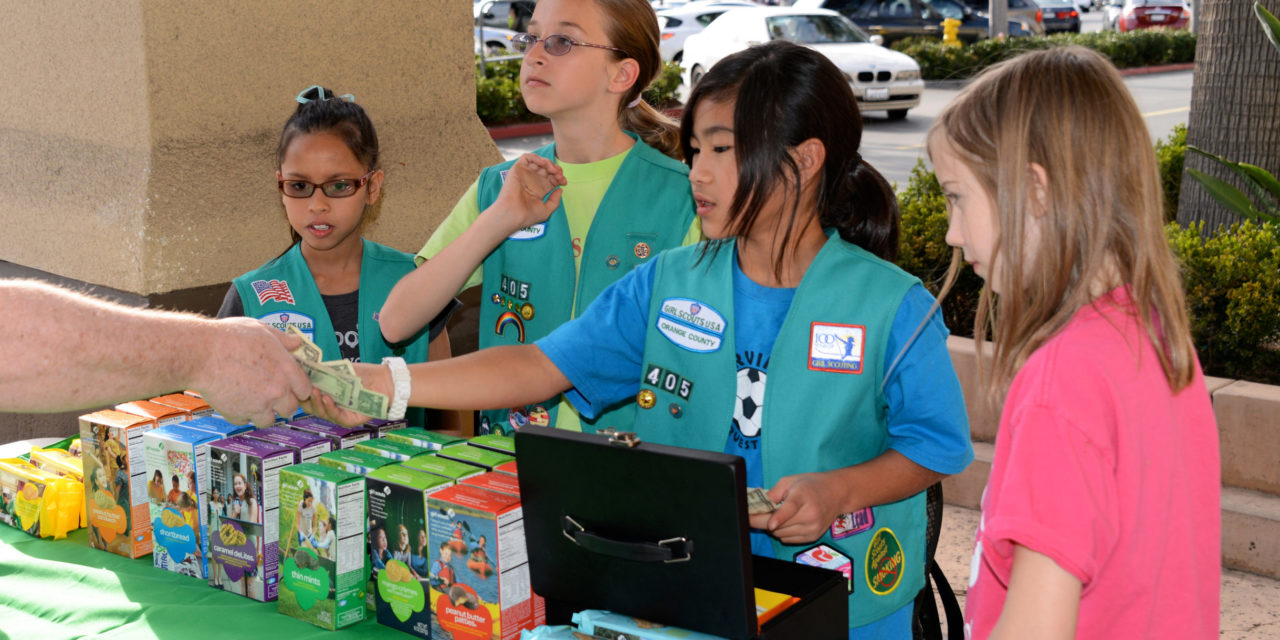Girl Scout cookie season is officially underway, and this year’s lineup includes fan favorite Thin Mints and a new flavor, “Raspberry Rallys” – a crispy thin offering dipped in chocolate with a raspberry filling.
Whether parked outside your local grocery store or walking the neighborhood selling door-to-door, it’s difficult to miss the Girl Scout cookie cavalry, a force that’s grown more formidable and successful over the years. Scouts and troops now have their own websites for ordering. And in the wake of the pandemic, even DoorDash got involved, offering to help make deliveries. Cookies are also available by mail.
There’s no doubt about it – these small girls have a big business going.
By the time the last cookie is delivered this spring, the Girl Scouts of America are expected to sell over 200 million boxes. With prices ranging between $4 to $7 a box, that’s somewhere in the neighborhood of $1 billion.
While the cookie program is marketed and promoted from the Girl Scouts of the USA (GSUSA) corporate offices, the organization regularly touts that after the cost of the actual cookies are covered, all proceeds go to fund local troop efforts. If you go on the GSUSA website, you’ll see a Samoa divided up into three parts describing where all the money goes. According to the graphic, 24% goes to Girl Scout Cookie Program and bakery costs, 22% goes toward troop proceeds and girl rewards, and 54% “is invested in girls through programs, properties, volunteer support and training, financial assistance, and council services.”
“What makes Girl Scout Cookies even sweeter?” asks Wendy Lou, GSUSA’s chief revenue officer. “Behind every box is a girl learning important skills to power her leadership journey and unlock a world of opportunities.”
Comforted by the assurance of local control, many Christian parents have allowed their daughters to participate in the Girl Scouts, though many have exited the organization for excellent faith-based alternatives like American Heritage Girls (AHG). Founded by Patti Garibay in 1995, AHG is unapologetically Christ-centered, and was created after the GSUSA no longer required girls to make a pledge to God.
Unease with the Girl Scouts predates their 1993 vote omitting “God” from their pledge. It was back in the 1970s when progressive sex-ed programs became part of some troops’ culture. More recently, the organization has embraced the need to root out supposed systemic racism. In 2020, the organization tweeted congratulations to then Judge Amy Coney Barrett for becoming the fifth woman appointed to the Supreme Court. But within hours, the tweet was gone.
In recent years, the GSUSA has tried to promote a posture of neutrality on hot-button social issues, but one has to wonder why an organization that claims to support girls and their interests would remain silent on the killing of innocent children in the womb, half of which are females.
Go to their website and you’ll see their explanation:
“Girl Scouts of the USA (GSUSA) does not take a position or develop materials on these issues. We feel our role is to help girls develop self-confidence and good decision-making skills that will help them make wise choices in all areas of their lives.”
Yet the very best decision a woman who is pregnant with an unplanned pregnancy can make is choosing life. Abortion is a deadly decision that scars women for life and damages self-confidence. Aborting a child isn’t just unwise – it’s immoral and tragic.
When it comes to navigating sexually confused youth, the GSUSA says, “If the child is recognized by the family and school/community as a girl and lives culturally as a girl, then Girl Scouts is an organization that can serve her in a setting that is both emotionally and physically safe.”
Translation: the GSUSA will accept biological boys who identify as girls.
In other words, despite a massive platform and opportunity to clarify and do good, the GSUSA has abandoned and forfeited the chance to counsel, advise, shape and positively impact the next generation. True “girl power” comes when a young female understands her responsibility to the broader culture, especially the most vulnerable among us.
So, given all of that, it’s understandable why the organization has dropped upwards of 30% of its membership in recent years – and why many might think twice before buying cookies from the organization this winter and spring.
Photo from Shutterstock.






